- Home
- Justin Bell
Aftershock_the Thrilling Post-Apocalyptic Survival Series Page 3
Aftershock_the Thrilling Post-Apocalyptic Survival Series Read online
Page 3
Angel stepped up into the helicopter and dropped down into a crouch by the stacks of paper scattered across the floor.
“Figured I’d come and see how this was coming.”
Fields looked back toward the paper. “It’s not coming at all. Not at the moment, anyway. Something’s missing. I’ve been through every ream of paper forward and back over the past six weeks and something is definitely missing.”
“What exactly are you looking for?”
Rebecca lowered from her knees into a seated posture, crossing her legs. “Well, you see, Ricky Orosco, the FBI agent who… the guy who died. He was in charge of the tactical team I belonged to down in Houston, and I got to know him. He had a sharp head and he was a rock solid investigator for being a field ops dude. Rumor was he’d be moving from the street to an office in a few months’ time. I know that’s what he was working for. His family was struggling financially.”
“Shame what happened to him,” Angel said, shaking his head.
Fields nodded. “Well, he and Agent Liu were both convinced there was something going on behind the scenes that connected these incidents. Convinced that the North Koreans had some help, and that help came from some domestic militia movements. Ricky said he had all sorts of proof and that he’d combed through all these paper records. I’d even grabbed a bunch of stuff from the DEA for—” she paused for a moment, turning and looking at the paper on the floor of the helicopter. “That’s it,” she breathed.
“What?”
She looked back at Angel. “That’s what’s missing. None of the stuff from the DEA that I brought him is here.”
“Did he leave it in Houston?”
“Lord I hope not,” Becky said.
Angel dropped from his crouch into his own seated position, leaning over to sift through some of the papers.
“So, uh… when are you going back?” he asked, glancing at Fields. “When are you going to head back to Texas?”
Becky flashed him a look. “Why do you want to know?”
Angel smiled and shrugged, trying to remain distinctly non-committal. “Just curious I guess.”
She went back to looking at the papers. “I don’t know. There’s nothing for me there, really. My family is from Mississippi, but I don’t really get along with many of them. Mom and Dad weren’t too happy about me becoming an agent. Wanted me to stay in town like my brothers.”
“Why didn’t you?”
“I don’t know,” she replied. “I always wanted something more. I thought I could do something more. Last thing I wanted was to be a third generation Fields running Fields Hardware and Supply down on Main Street. I mean, my brothers are into it, good for them, but it was never my bag.”
“So what made you want to join the FBI?”
Becky’s cheeks flushed. “Nah, it’s stupid.”
Angel smiled. “Oh now I have to know.”
She chuckled, shaking her head. “It’s all Jodie Foster’s fault.”
“Who’s Jodie Foster?”
“Shut up!” Rebecca said. “You know Jodie Foster!”
Angel shrugged.
“You’re hopeless.”
“Yo, I’m a Mexican kid from Southern Cali. I don’t know all those white actresses in all those fancy movies. Who’s got time for that?”
Becky chuckled. “Well, if we ever get power again, you should check out Silence of the Lambs. Best movie ever.”
“I’ll take y’alls word on that one.”
He sat in silence for a few minutes as Rebecca pushed herself to her feet, then strolled back toward the rear of the helicopter. In the back corner of the main cargo area a few more boxes were stacked, tops opened and a few papers spilled out onto the floor. She peeled off the top box and dumped it on the floor, then dug through the next box in the pile, rifling through the paperwork inside.
“What about you?” she asked, glancing over her shoulder. “You have somewhere you’re supposed to be?”
Angel stood himself and wandered over to where she was. “Nah. Like I said before, I’m from South Cali. My whole family was wiped out in the nukes. At least, I’m pretty sure they were. If they weren’t, they’re hating life right now.”
“Oh, man, Angel,” Fields said, turning toward him. “I’m sorry. I didn’t know that.”
Angel shrugged. “I’ve made peace with it. Not like I can change it, right?”
“So how’d you get connected with the Frasers?” She turned back toward the papers and continued searching through them, her back to him.
He drew in a long, calculated breath. “Long story,” he said. “I… well, I spent some time locked up.”
Becky’s head whipped around, her eyes narrowing at him. “What?”
“Yeah. Maybe someday I’ll tell you the whole story, I dunno. I get sick of talking about it. Anyway, a bunch of ex-cons took over this school, they were using it for a stronghold or something. Frasers came along, and they wanted to kill ‘em. To this day, I don’t know why. Not sure what the point was.”
“So you helped the Frasers?”
Angel shrugged again. It was his default gesture. “I guess, yeah. We got out together, they let me stick around. I don’t think they trusted me at first, heck I don’t think some of them do yet. But they let me tag along. I’m kind of a third wheel, but it’s alright. Better than being stuck in that school.”
“Where was it?”
“Near Denver.”
Becky made a face that Angel couldn’t translate. “Yeah, I think Colorado is under a red cloud right now. You made the right call.”
“Really?”
Becky nodded. “Last I heard. Almost everything from the Rocky Mountain region on west is uninhabitable. Then there’s the pocket down in Galveston.”
“Dang,” Angel whispered. “What is happenin’ to the world?”
“I officially have no idea,” Becky replied, then reached her hand into the box and pulled out two fistfuls of paper. “But I’m sure as hell going to do whatever I can to find out.”
Chapter 2
“Sun’s out, guns out, compadres! Let’s see them pistolas!”
“Dang, Lonzo, it’s like six in the morning,” muttered Tamar, swinging his legs out of bed and digging his knuckles deep into his eye sockets.
“The end of the world don’t follow a schedule, kid!” Lonzo barked.
“I think I liked it better when I was in school.”
“Get yer butt out of that bed and get to the armory, Tamar. Field strip 101 begins now, punk. Let’s go, let’s go, let’s go!” Lonzo banged his palm on the iron frame of the bed, echoing within the confined bedroom. Tamar nodded sleepily, trotting from the room, with three more young children right on his heels, bare feet slapping the concrete floor as they moved.
Lonzo Velez smiled as he watched them run into the hallway, angling right toward the armory. He could hear more footsteps hitting the ground joining a growing cacophony of skin on cement, then shifting to the pale green tile of the access hallways. This time of morning, the building was scantly lit, the gentle blob of sun glowing in through opened windows, shrouding the hallways and classrooms in a vague orange glow.
A school seemed an appropriate place for Lonzo’s crew. It was a three-floor brick structure, not built for aesthetics, but for raw, blunt functionality. A square slab of brick and stone dropped in the center of town, this small suburban outpost was just outside the thick concrete jungle of Chicago. It was a different environment than he had been trained in, as a United States Marine, but the end result was the same. Hostile territory, stay on your guard, and follow orders… do all of those things, and maybe you’d survive.
Lonzo walked from the classroom which had been converted to a bedroom in the past six weeks, as had pretty much all the classrooms on the second floor, just enough of them to hold all thirty inhabitants of the school building.
Had it been six weeks ago? Lonzo turned the corner and approached the tile hallway, his boots clopping across the floor in a much deeper
, louder echo than the slapping of bare feet, and he thought back to how the whole thing started. How had all of this started? And how was it that nuclear explosions an entire nation away had such a dramatic and swift impact on the city? On his city?
He couldn’t fool himself. He knew why. Human nature was why. When the word started hitting about nuclear detonations up and down the west coast, and a last-minute prevention in Boston, it was pretty much assumed that Chicago would be next. It was a border city, close enough to Canada, and one of the largest cities in the country. If North Korea had been able to hit Boston and San Francisco, there was no doubt in anyone’s mind that Chicago would be soon to come.
Until it wasn’t.
But by then, it was too late.
In his mind he could see the people taking to the streets, the flood of frightened, angry citizens, the slow, arcing trail of fire from Molotov cocktails, the swift barks of gunfire, an entire city of armed citizens frantic for their very existence.
As he thought back, he was surprised it took as long as it did. Two weeks, more or less? Maybe three. Once the Illinois National Guard showed up, attempting to declare martial law, everything went down the drain. Riots in the streets, innocent people thinking they were being kept in a city that was destined for destruction. Angry criminals and bad elements with automatic weapons who saw it as a chance to take control of some slice of the pie. Lonzo Velez had seen his share of R-rated movies. He’d seen plenty of gunfights, horror films, buckets of Hollywood blood being shed for the sake of the almighty dollar. But nothing could have prepared him for what he saw in those two weeks. Absolute carnage. Chicago had become a certified war zone. Serving in the Marines for four years, it certainly wasn’t the first time he’d seen combat, but it was different somehow. The backdrop of battle was the very neighborhoods he’d grown up in, not some strange foreign land.
The harder the National Guard pushed back, the more resistance they got. More innocent civilians joined the sides of the criminals, thinking they were fighting to escape, to try to get free. Then the power went out. Internet and cellphone service stopped working within the city as well as outside. Distribution of goods and services fell apart, and suddenly, in less than a month, Chicago had gone from a thriving, modern city, to a darkened, burnt refuge, a shell of its former self, gunmen and criminals roaming the streets, taking over city blocks and proclaiming them theirs.
Lonzo took a left down the hall, his eyes narrowing as he caught the scramble of three more small forms darting across the hall, heading toward the armory.
His dad had been a cop with Chicago P.D., a Sergeant he was pretty sure, though as the days went on it was tough to remember. Jorge Velez hadn’t lasted a week. While many of his fellow officers abandoned their posts for the sake of their safety and their family, Jorge Velez stayed at work. Tried his best to reign in the criminal element, to help the National Guard enforce martial law, to bring some semblance of peace to a city which was swiftly and clearly falling apart.
Lonzo never saw what they did to him, but he heard the rumors. He heard the stories about the Englewood gang cutting off his dad’s head and sticking it on a tall, iron gate blockading their little corner of the city. Stripping his uniform off him and hanging it like a flag. It still made him sick to think about it, and when that gang rushed his home, he’d run as fast as he could. His mom had been screaming in the living room, telling him to run, to just get out, and that’s what he’d done. Kicking through the back-door window, he’d scrambled out and hit the alleys and he had just run.
Looking around the hallway as he turned toward their makeshift arsenal, his memory of getting to this place was a fog—a vague, scant recollection of running through backstreet alleys and ducking around empty, parked cars, desperate to escape the city. His eyes streaming tears over the deaths of his mother and father, never knowing what happened to his three sisters and his brother, just leaving everything he knew behind and running as far and as fast as he could. There he was, a twenty-two-year-old man, four years in the Marine Corps, and he was running through backyards and back streets, tears streaming down his face. He was glad his Drill Sergeant hadn’t been there to see that.
By the time he was done running, the Chicago skyline was on the horizon, far closer than it seemed, but far enough away that the endless staccato rattle of gunfire was an abstract thing, not a violent, brutal reality. It was something that was there, it existed, and he could hear it in the distance, but he didn’t have to worry about getting shot.
Well, until Ironclad showed up.
Lonzo stepped out into the wide, long room, the former school cafeteria that once upon a time supplied the children of this school with two of their three square meals a day. In some cases, the only two real meals these children got.
Today, however? After a nuclear cataclysm? Meals and food seemed so passé, and these days, the cafeteria served a much more essential purpose: the armory. Lonzo had an idea when he first started gathering the kids here, those wandering children he found on the streets of the Chicago suburbs. He’d had an idea he’d be saving them from the violence that swarmed their city streets. Taking them to a place of relative safety and peace. And, just maybe, redeeming himself for running when he should have stood his ground.
He learned that place did not exist. Not here, and likely, not anywhere. Not anymore. So, perspectives changed. Location wasn’t the sole determinate of safety these days… you needed protection. But not the protection of adults, Lord knew they’d botched that all up already. These kids, and him, needed to protect themselves. There was a time when shelter, education, food and water were considered enough, but those days were long since gone.
The former cafeteria still looked like a cafeteria, black and white tile floor, the lunch counter all along the left side wall and long, rectangular tables set up in even rows throughout the large, open floor. Boys and girls of various ages had scattered throughout the floor, situating themselves along the tables. Instead of plates, bowls or trays, each long, faux wood table was filled with weapons. Mostly pistols, but some rifles, all set in neat, orderly rows, side by side, filling up much of the bare space on each flat surface.
By and large the pistols were Glock 19’s, though a mixture of Beretta nine millimeters and a few revolvers of various calibers were sitting in assorted places. The half dozen or so rifles were all different types of M4 Carbines, some outfitted with tactical kits, others more bare bones.
Tamar looked up from his spot at the first table, his eyes heavy, and his hair still a tousled mess. The other children shuffled around the room, finding their places next to each table.
“You know the drill,” Lonzo said as he entered. “Every weapon gets field stripped and cleaned, then reassembled. Every one of them!”
A chorus of tired groans echoed in the long room.
“Get it done quick and maybe you’ll get an early breakfast!”
Tamar reacted to this, looking over, his eyes widening somewhat. “Breakfast? Something good?”
Lonzo smirked. “Ally made a supply run last night,” he replied. “Frozen foods warehouse over near South Street that had a freezer running on a solar backup. She scored twenty boxes of Eggo’s.”
The room erupted in a raucous cheer, hands pumping in the air. A young girl jumped and pumped her fist.
Tamar glanced around the room. “Where’s Ally?” he asked. “I wanna give her a high five!”
“I’m letting her sleep in,” Lonzo replied. “That’s her reward.”
“She deserves it!” Tamar shouted.
“All right, enough goofing off, Orphans!” Lonzo shouted. “Strip ‘em and clean ‘em. Then it’s time to eat!”
The boys and girls all shouted their acknowledgement and dove forward, hands shuffling through the weapons set on the tables, peeling them apart, and inspecting them, going to work cleaning them as Lonzo looked on.
The Orphans. That’s who they were. Who they all were. Children of the streets of Chicago, whose parents we
re either dead or missing. Lonzo had started with one or two of them—Tamar had been first. They’d formed into teams, taking runs into the city or around the perimeter to get food and supplies before returning to the school to stock up. It had been working out pretty well.
And then came Ironclad. Ironclad Security was a well-known corporate entity in the Chicago suburbs, a global corporation whose headquarters were stationed in one of the neighboring towns. A security contractor with various connections to the American government, Ironclad’s multi-level corporate office had drawn the attention of The Orphans as a source for food or supplies. However, as it turned out, the inhabitants of the Ironclad offices had apparently started running low on supplies themselves, and before long, The Orphans and Ironclad found themselves racing for the same resources, trying to feed, house, and support their own at the expense of the others. The fact that The Orphans were more or less children didn’t seem to matter to the folks at Ironclad, and in several cases, the conflict had gotten violent.
So violent, in fact, that two of Lonzo’s first few rescues had been killed simply trying to find scraps of food for that night’s dinner. Two of them had died and one had vanished. The girl that had disappeared was the one that truly haunted him, the one that never seemed to leave his mind. He’d seen the bodies of the two high-school-aged kids who had been shot to death, but that girl? She was just gone. For all he knew, she was still roaming the city streets, dodging danger and barely surviving.
Ever since then, much of the supply running had turned into a search for weapons. The Orphans had staged several well-orchestrated ambushes, knocking out Ironclad guards and stealing their equipment, while in other cases, they’d ventured into the city itself and stripped some gang members of the weapons they carried.
As a result, in six weeks of being on their own, operating as the group calling themselves The Orphans, they’d managed to put together a pretty impressive arsenal of weaponry, and had used it from time to time in small skirmishes against Ironclad. Things were still not as escalated as they were inside Chicago itself, but the street had become a dangerous place, even out in the suburbs.

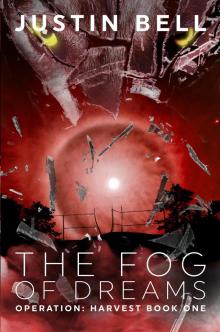 The Fog of Dreams
The Fog of Dreams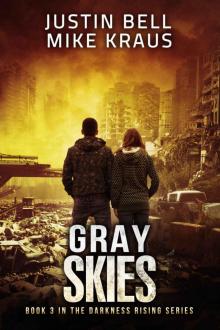 Gray Skies
Gray Skies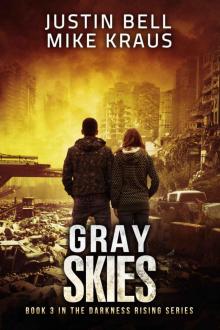 Gray Skies_the Thrilling Post-Apocalyptic Survival Series
Gray Skies_the Thrilling Post-Apocalyptic Survival Series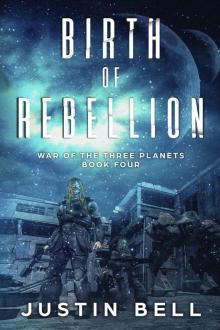 Birth of Rebellion (War of the Three Planets Book 4)
Birth of Rebellion (War of the Three Planets Book 4)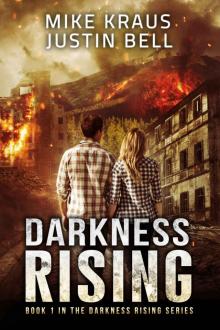 Darkness Rising
Darkness Rising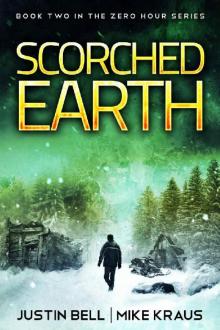 Scorched Earth: Book 2 in the Thrilling Post-Apocalyptic Survival Series: (Zero Hour - Book 2)
Scorched Earth: Book 2 in the Thrilling Post-Apocalyptic Survival Series: (Zero Hour - Book 2)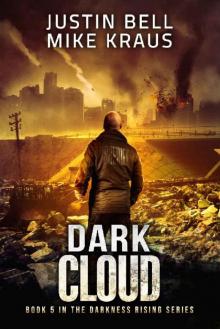 Dark Cloud: Book 5 in the Thrilling Post-Apocalyptic Survival Series: (Darkness Rising - Book 5)
Dark Cloud: Book 5 in the Thrilling Post-Apocalyptic Survival Series: (Darkness Rising - Book 5)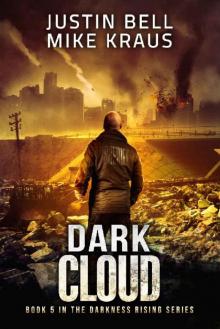 Dark Cloud_Thrilling Post-Apocalyptic Survival Series
Dark Cloud_Thrilling Post-Apocalyptic Survival Series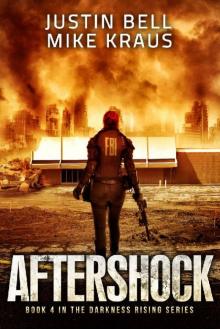 Aftershock: Book 4 in the Thrilling Post-Apocalyptic Survival Series: (Darkness Rising - Book 4)
Aftershock: Book 4 in the Thrilling Post-Apocalyptic Survival Series: (Darkness Rising - Book 4) Aftershock
Aftershock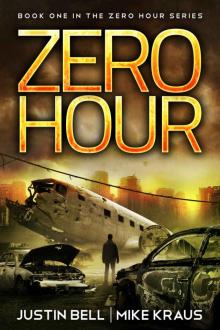 Zero Hour: Book 1 in the Thrilling Post-Apocalyptic Survival Series: (Zero Hour - Book 1)
Zero Hour: Book 1 in the Thrilling Post-Apocalyptic Survival Series: (Zero Hour - Book 1)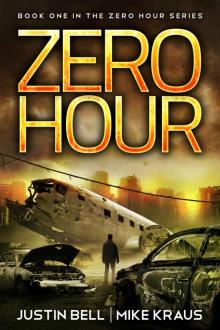 Zero Hour_Thrilling Post-Apocalyptic Survival Series
Zero Hour_Thrilling Post-Apocalyptic Survival Series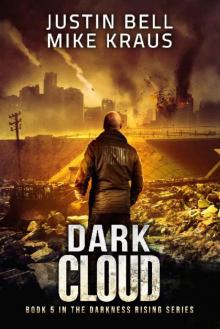 Dark Cloud
Dark Cloud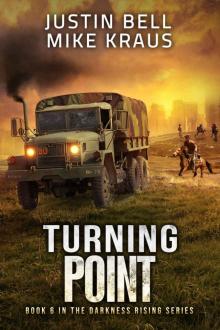 Turning Point: Book 6 in the Thrilling Post-Apocalyptic Survival Series: (Darkness Rising - Book 6)
Turning Point: Book 6 in the Thrilling Post-Apocalyptic Survival Series: (Darkness Rising - Book 6)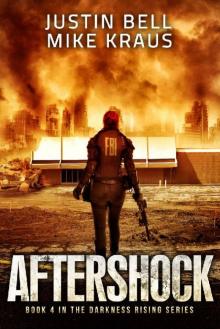 Aftershock_the Thrilling Post-Apocalyptic Survival Series
Aftershock_the Thrilling Post-Apocalyptic Survival Series War of the Three Planets Collection (Book 01)
War of the Three Planets Collection (Book 01)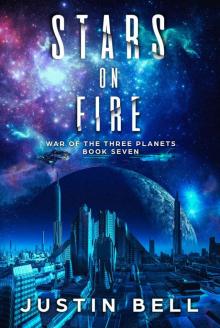 Stars on Fire
Stars on Fire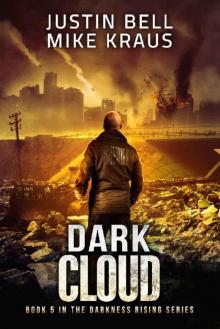 Dark Cloud_the Thrilling Post-Apocalyptic Survival Series
Dark Cloud_the Thrilling Post-Apocalyptic Survival Series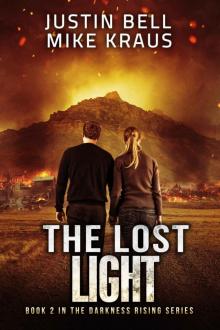 The Lost Light
The Lost Light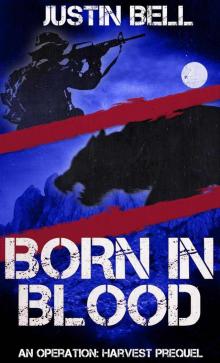 Born in Blood
Born in Blood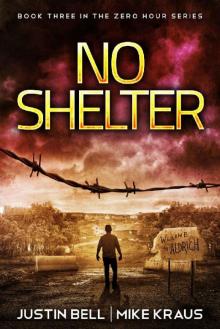 No Shelter: Book 3 in the Thrilling Post-Apocalyptic Survival Series: (Zero Hour - Book 3)
No Shelter: Book 3 in the Thrilling Post-Apocalyptic Survival Series: (Zero Hour - Book 3)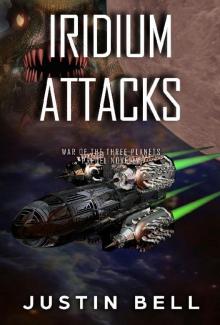 Iridium Attacks
Iridium Attacks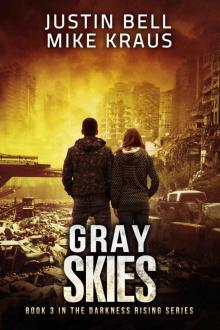 Gray Skies: Book 3 in the Thrilling Post-Apocalyptic Survival Series: (Darkness Rising - Book 3)
Gray Skies: Book 3 in the Thrilling Post-Apocalyptic Survival Series: (Darkness Rising - Book 3)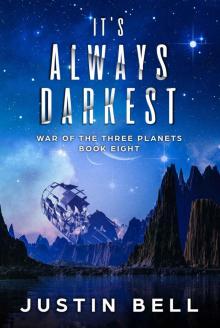 It's Always Darkest
It's Always Darkest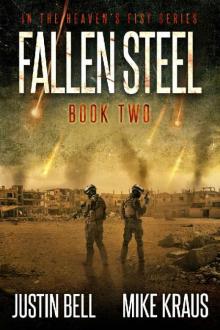 Fallen Steel: Book 2 in the Thrilling Post-Apocalyptic Survival Series: (Heaven's Fist - Book 2)
Fallen Steel: Book 2 in the Thrilling Post-Apocalyptic Survival Series: (Heaven's Fist - Book 2)